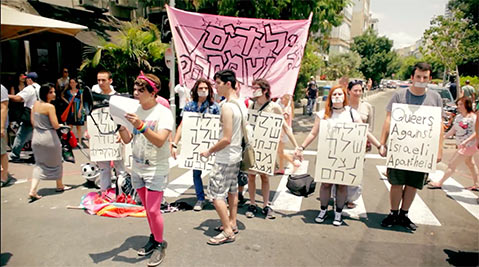A Queer Country
Producer Harriet Davies

The documentary A Queer Country focuses on Tel-Aviv’s strong LGBTQ community, an island of queer pride in a staunchly conservative region of the world. Producer Harriet Davies talks the filming and what makes Tel-Aviv a special place for the LGBTQ community.
What inspired you to make the documentary? Was there a particular moment?
There was a particular moment when we (Lisa and I) decided to make the film. Lisa had retrained in documentary directing following a career in advertising and I had just left a job at a newspaper group. She told me she wanted to make a film about the LGBTQ scene in Tel Aviv and as I had worked and trained as a journalist I decided to go along with her and act as researcher/producer. Everything evolved from there.
I was so impressed by the breadth and depth of interview subjects for the film. How did you find them all?
Looking back, we approached this in a blissfully ignorant way! I now understand that people tend to make documentaries by researching their characters and story structures thoroughly at the start of the process. We went to Israel first and thought we would find our characters there. Once we were there, we went straight to the local gay center and pursued any leads we could find of activists and groups doing interesting work. We also got in touch with politicians. This had upsides and downsides. I think we ended up with a broad range of interviews by spending so much time there filming, and we also got a real feel for the LGBTQ scene that we tried to reflect through the tone, art and music in the film. On the other hand, the edit was a challenge!
Is there a historical point where we can trace the LGBTQ friendly atmosphere of Tel Aviv? Has it somewhat always been this way?
The friendly atmosphere in Tel Aviv has clearly been supported by the municipal government in recent years, but I think the grassroots activists really started the movement before the government got involved. There are so many local organisations supporting different parts of the community, and the early founding of groups like the Aguda in the 70’s allowed people to connect and create a political force. I think that was a moment of change. But we saw vociferous debate and activity still going on today over issues like Pinkwashing and the social treatment of the transgender community; the feeling was that things have improved, but there is work to be done.
Salt Lake City, a heavily religious Mormon community in the U.S., also has one of the strongest queer communities in our country. Do you think queer communities are perhaps strongest in places where they are seemingly most opposed?
I think being opposed creates unity, and having a challenge creates energy for a struggle. Those emotional responses might give rise to a phenomenon like that. In many ways the LGBTQ community in Tel Aviv felt more connected and active than the community in London. On the other hand, that intensity means you can be exposed very easily when you go outside of that community or bubble. We felt that when we left Tel Aviv.
Going forward, what do you see as the biggest challenges for LGBTQ communities in Tel-Aviv?
I think the challenge will be in broadening the achievements of Tel Aviv to Israel. Israel is an incredibly diverse place and its different parts of society did not, to an outsider, always appear well integrated. Its laws pertaining to marriage and divorce, for example, pose real problems for the LGBTQ community, as they are inherently divisive and therefore do not lay foundations for a tolerant, inclusive society. Overcoming these barriers would be real progress.
From my perception, much of the world at large is in a state of contraction and extreme conservatism, including, of course, the U.S. In what ways is Tel-Aviv or Israel in general a model for how to address potentially impending conservatism?
I think social conservatism is often driven by fear of existence of an identity or community. Israel suffers from this fear and is considered politically very conservative in most respects. However, Tel Aviv’s, and to some extent Israel’s, embrace of the LGBTQ community is an example of how having the courage to be tolerant makes us stronger. Adapting a society to make it more welcoming ultimately broadens that society’s membership and makes it more powerful. But for that to happen, there needs to be space for different and even conflicting ideas and opinions to exist.



